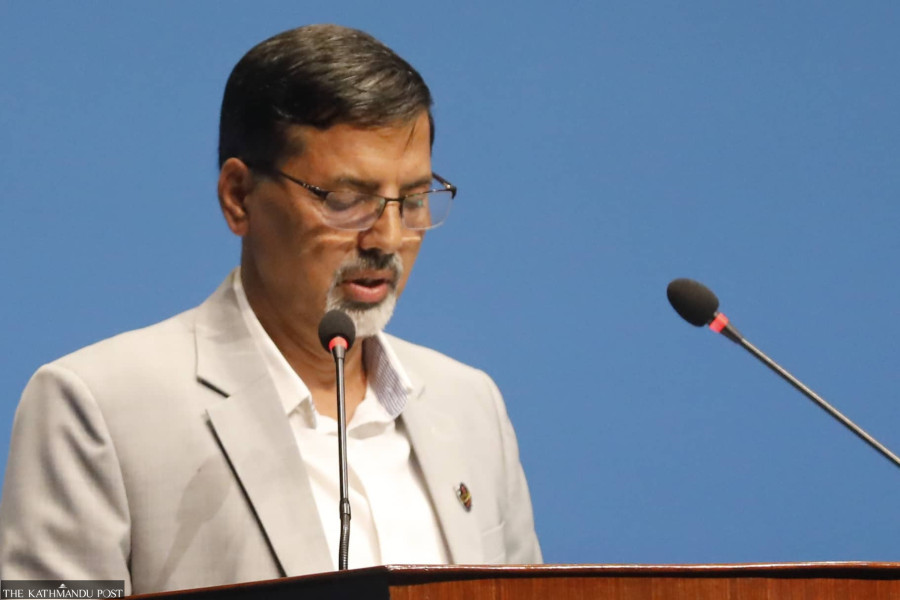National
Closing or drawing down some Nepali foreign missions is always on agenda but not a priority
Like his predecessors, Finance Minister Janardan Sharma in his budget speech on Sunday announced government plans to review the number of Nepali missions.
Anil Giri
Since 2018, when finance minister Yuba Raj Khatiwada presented the annual budget, one issue that has never missed mention in the budget speech is that the government will “review its missions abroad, close down unnecessary missions, and add a new one.”
Khatiwada made the announcement in his budget speech in May 2018, and in the following November, the Ministry of Foreign Affairs formed a task force headed by former ambassador Rudra Nepal with representatives from finance, foreign affairs, and general affairs ministries, and a member from the Institute of Foreign Affairs.
Later, after working for some time, the task force members were transferred to other government offices, so the panel was unable to submit its final report. The task force, however, made some recommendations to the Ministry of Foreign Affairs.
This Sunday too, Finance Minister Janardan Sharma in his budget speech announced government plans to review the number of Nepali missions.
“The number of missions abroad will be reviewed on the basis of necessity and justification by analysing the changing environment and workload,” Sharma said.
He also announced that a virtual embassy would be set up and through it, services would be provided where necessary or where Nepal does not have a physical mission.
Following the announcement, foreign affairs experts are asking whether it is possible to reduce the number of embassies, and whether it is possible to set up a virtual embassy. But two joint secretaries at the Ministry of Foreign Affairs told the Post that prior to the consultations for the budget with the officials at the ministry, both issues—reducing the number of the Nepali missions and running virtual embassies—were not discussed.
“We made some recommendations but we could not submit the full report after the portfolios of some officials in the task force were changed,” said Nepal, the former ambassador. “In the absence of the representatives from the Finance Ministry, we could not conclude the full report but whatever suggestions and inputs we had gathered, we submitted to the Foreign Ministry.”
The Nepal-led panel recommended shutting down some missions that are “not important” to Nepal.
And we can add a few embassies in countries that are important in regional and global contexts. Among such countries is Indonesia. Since it is a growing economy and member of the G20, Nepal should have its diplomatic presence in Indonesia, the panel has recommended. In some cases, the level of representation or the numbers of staff in the missions can be reviewed, said Nepal.
Nepal has six consulate general offices and 33 embassies, including three permanent missions to the United Nations—in New York, Geneva and Vienna. The annual budget of the Foreign Ministry is currently around Rs2 billion—or 0.51 percent of the national budget—with most of the funds allocated to renting offices, chanceries, and residences for Nepali missions abroad. Nepal spends around Rs800 million for the operation of its embassies.
In its recommendations, the Nepal-led panel had suggested closing down the embassies in Spain and Denmark.
“If Denmark is closing its embassy in Kathmandu why not we reciprocate and shift the embassy to Norway, which has a residential mission in Kathmandu,” a member of the Nepal-led panel said. “If Canada has moved its embassy from Kathmandu to New Delhi, there is no point for Nepal to continue our mission in Canada.”
Similarly, the panel has suggested that Nepal move its embassy in South Africa to Kenya. “Since Kenya is hosting several international agencies, we can relocate our embassy from South Africa to Kenya,” another joint secretary said, adding, “And since Turkey is going to open its mission in Kathmandu in September, now we have to reciprocate by opening our embassy there.”
As of now, there is no plan to reduce the numbers of the Nepali embassies but we can relocate some of them to other more important places, said the joint secretary.
Ahead of preparing the budget in 2018, according to one joint secretary, both finance and foreign affairs ministries had in principle agreed to either draw down or relocate Nepal’s missions in Spain, Brazil, South Africa, Canada, Austria, and Denmark by assessing the scope of work. Apart from Brazil, none of these host nations has set up their own missions in Kathmandu on a reciprocal basis.
“But the Ministry of Foreign Affairs did not cooperate with us,” the joint secretary said, adding, “The number of unnecessary missions should be closed down, and this will not only reduce the financial burden but also allow scope for pursuing shrewd diplomacy.”
Even a high-level task force report, submitted by Prof Sridhar Khatri, current Nepali ambassador to the US, in February 2018, had recommended a review of the number of Nepali missions abroad after assessing their performance.
But after Narayan Khadka’s appointment as foreign minister last September, the foreign ministry has not held serious discussions on drawing down Nepali missions, according to officials.
“Some issues are easy to do but difficult to undo. The issue of drawing down Nepali missions is one of them,” said Durga Bhattarai, former foreign secretary and Nepal’s permanent representative to the United Nations.
Also, it takes at least four-five years to close down an embassy and there are diplomatic implications of such action, according to officials.
“Since our politicians have the habit of appointing people close to them as envoys, I don’t see there will be any change in the status quo.”




 16.12°C Kathmandu
16.12°C Kathmandu















